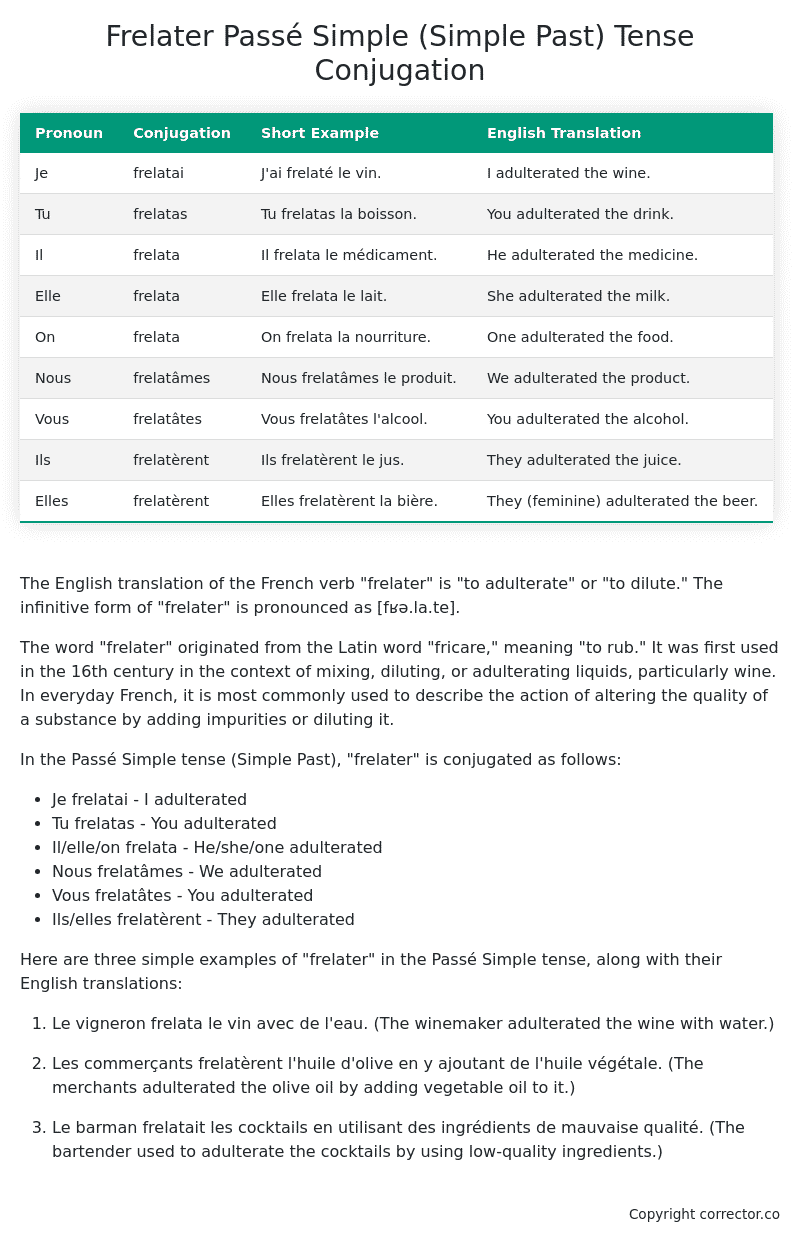Passé Simple (Simple Past) Tense Conjugation of the French Verb frelater
Introduction to the verb frelater
The English translation of the French verb “frelater” is “to adulterate” or “to dilute.” The infinitive form of “frelater” is pronounced as [fʁə.la.te].
The word “frelater” originated from the Latin word “fricare,” meaning “to rub.” It was first used in the 16th century in the context of mixing, diluting, or adulterating liquids, particularly wine. In everyday French, it is most commonly used to describe the action of altering the quality of a substance by adding impurities or diluting it.
In the Passé Simple tense (Simple Past), “frelater” is conjugated as follows:
- Je frelatai – I adulterated
- Tu frelatas – You adulterated
- Il/elle/on frelata – He/she/one adulterated
- Nous frelatâmes – We adulterated
- Vous frelatâtes – You adulterated
- Ils/elles frelatèrent – They adulterated
Here are three simple examples of “frelater” in the Passé Simple tense, along with their English translations:
-
Le vigneron frelata le vin avec de l’eau.
(The winemaker adulterated the wine with water.) -
Les commerçants frelatèrent l’huile d’olive en y ajoutant de l’huile végétale.
(The merchants adulterated the olive oil by adding vegetable oil to it.) -
Le barman frelatait les cocktails en utilisant des ingrédients de mauvaise qualité.
(The bartender used to adulterate the cocktails by using low-quality ingredients.)
Table of the Passé Simple (Simple Past) Tense Conjugation of frelater
| Pronoun | Conjugation | Short Example | English Translation |
|---|---|---|---|
| Je | frelatai | J’ai frelaté le vin. | I adulterated the wine. |
| Tu | frelatas | Tu frelatas la boisson. | You adulterated the drink. |
| Il | frelata | Il frelata le médicament. | He adulterated the medicine. |
| Elle | frelata | Elle frelata le lait. | She adulterated the milk. |
| On | frelata | On frelata la nourriture. | One adulterated the food. |
| Nous | frelatâmes | Nous frelatâmes le produit. | We adulterated the product. |
| Vous | frelatâtes | Vous frelatâtes l’alcool. | You adulterated the alcohol. |
| Ils | frelatèrent | Ils frelatèrent le jus. | They adulterated the juice. |
| Elles | frelatèrent | Elles frelatèrent la bière. | They (feminine) adulterated the beer. |
Other Conjugations for Frelater.
Le Present (Present Tense) Conjugation of the French Verb frelater
Imparfait (Imperfect) Tense Conjugation of the French Verb frelater
Passé Simple (Simple Past) Tense Conjugation of the French Verb frelater (You’re reading it right now!)
Passé Composé (Present Perfect) Tense Conjugation of the French Verb frelater
Futur Simple (Simple Future) Tense Conjugation of the French Verb frelater
Futur Proche (Near Future) Tense Conjugation of the French Verb frelater
Plus-que-parfait (Pluperfect) Tense Conjugation of the French Verb frelater
Passé Antérieur (Past Anterior) Tense Conjugation of the French Verb frelater
Futur Antérieur (Future Anterior) Tense Conjugation of the French Verb frelater
Subjonctif Présent (Subjunctive Present) Tense Conjugation of the French Verb frelater
Subjonctif Passé (Subjunctive Past) Tense Conjugation of the French Verb frelater
Subjonctif Imparfait (Subjunctive Imperfect) Tense Conjugation of the French Verb frelater
Subjonctif Plus-que-parfait (Subjunctive Pluperfect) Tense Conjugation of the French Verb frelater
Conditionnel Présent (Conditional Present) Tense Conjugation of the French Verb frelater
Conditionnel Passé (Conditional Past) Tense Conjugation of the French Verb frelater
Conditionnel Passé II (Conditional Past II) Tense Conjugation of the French Verb frelater
L’impératif Présent (Imperative Present) Tense Conjugation of the French Verb frelater
L’impératif Passé (Imperative Past) Tense Conjugation of the French Verb frelater
L’infinitif Présent (Infinitive Present) Tense Conjugation of the French Verb frelater
L’infinitif Passé (Infinitive Past) Tense Conjugation of the French Verb frelater
Le Participe Présent (Present Participle) Tense Conjugation of the French Verb frelater
Le Participe Passé (Past Participle) Tense Conjugation of the French Verb frelater
Struggling with French verbs or the language in general? Why not use our free French Grammar Checker – no registration required!
Get a FREE Download Study Sheet of this Conjugation 🔥
Simply right click the image below, click “save image” and get your free reference for the frelater Passé Simple tense conjugation!

Frelater – About the French Passé Simple (Simple Past) Tense
Formation
Usage
Narration
Historical Context
Interactions with other tenses
Passé Composé
Imparfait
Conditional and Subjunctive
Summary
I hope you enjoyed this article on the verb frelater. Still in a learning mood? Check out another TOTALLY random French verb conjugation!


